Financial Management Report: Stakeholders, Policies, & Objectives
VerifiedAdded on 2020/06/06
|6
|1393
|40
Report
AI Summary
This financial management report provides an overview of key concepts in financial management. It begins by exploring the role of management in meeting the objectives of various stakeholders, including customers, shareholders, and the government, with a focus on the application of agency theory. The report then delves into the impact of fiscal, monetary, interest rate, and exchange rate policies in achieving macroeconomic policy targets. It examines how these policies influence economic stability, demand and supply dynamics, and price stability. The report highlights the interdependencies between monetary and exchange rate policies and their combined effect on the economy. The conclusion emphasizes the importance of effective financial management in aligning stakeholder interests and achieving organizational and macroeconomic goals. The report is a concise summary of financial management principles, supported by references to relevant literature.
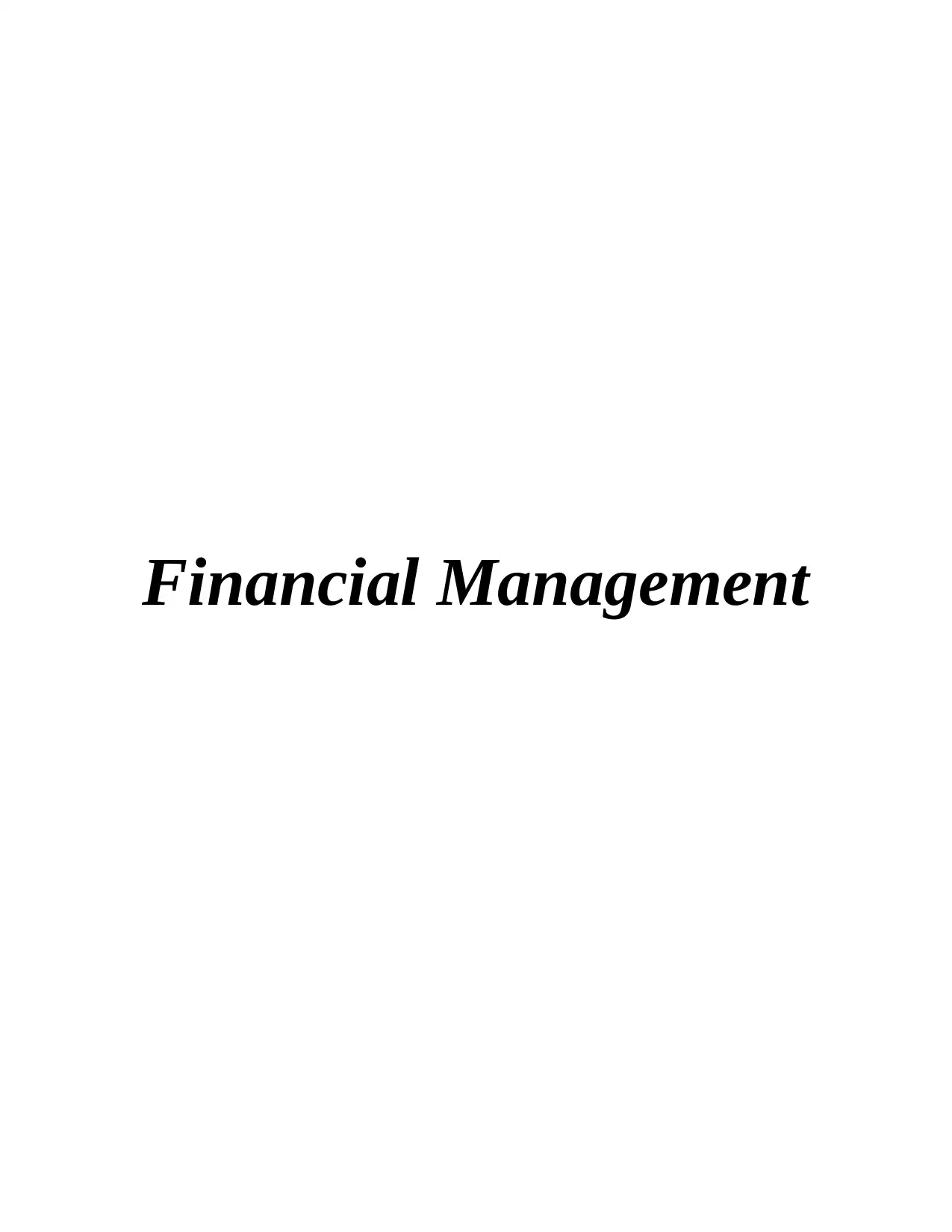
Financial Management
Paraphrase This Document
Need a fresh take? Get an instant paraphrase of this document with our AI Paraphraser
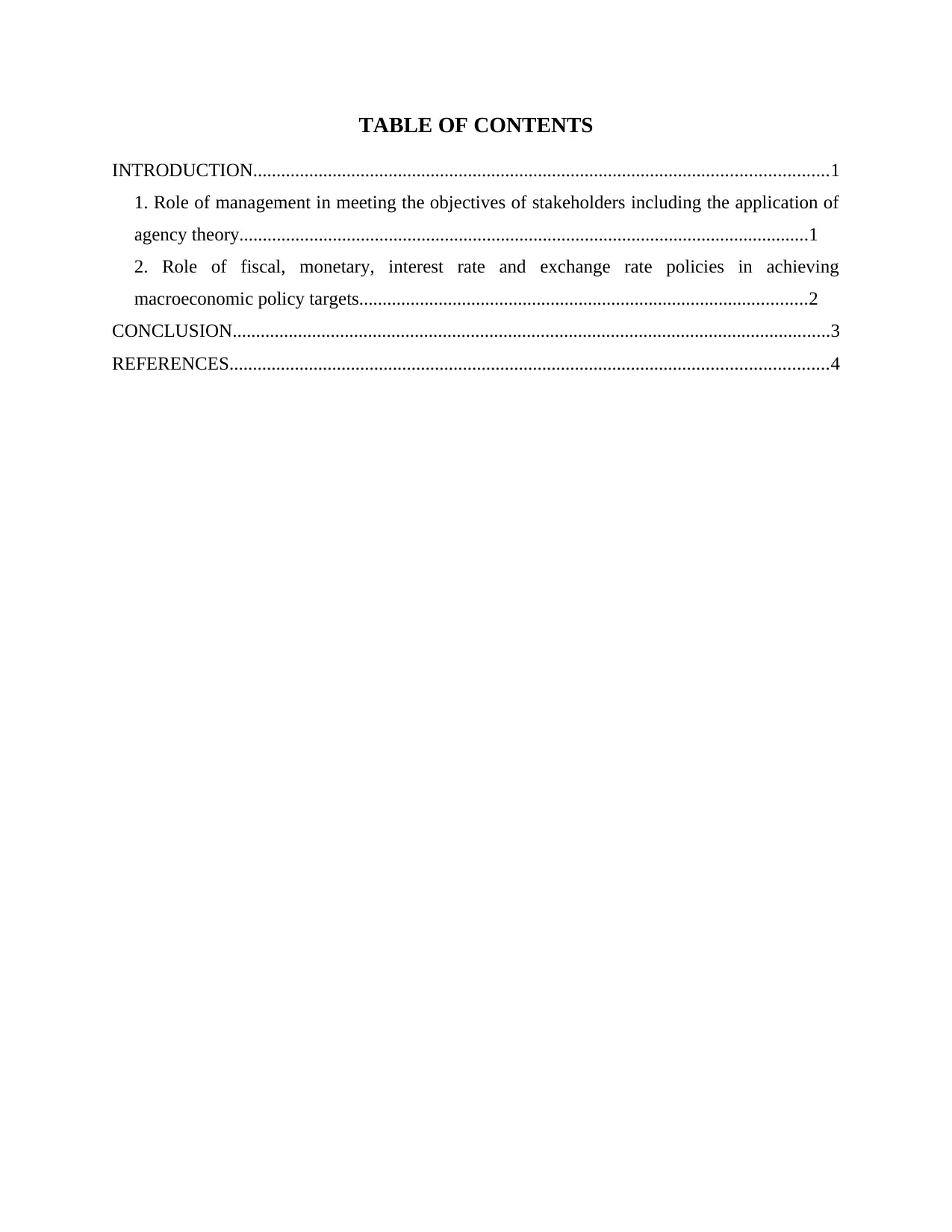
TABLE OF CONTENTS
INTRODUCTION...........................................................................................................................1
1. Role of management in meeting the objectives of stakeholders including the application of
agency theory..........................................................................................................................1
2. Role of fiscal, monetary, interest rate and exchange rate policies in achieving
macroeconomic policy targets................................................................................................2
CONCLUSION................................................................................................................................3
REFERENCES................................................................................................................................4
INTRODUCTION...........................................................................................................................1
1. Role of management in meeting the objectives of stakeholders including the application of
agency theory..........................................................................................................................1
2. Role of fiscal, monetary, interest rate and exchange rate policies in achieving
macroeconomic policy targets................................................................................................2
CONCLUSION................................................................................................................................3
REFERENCES................................................................................................................................4
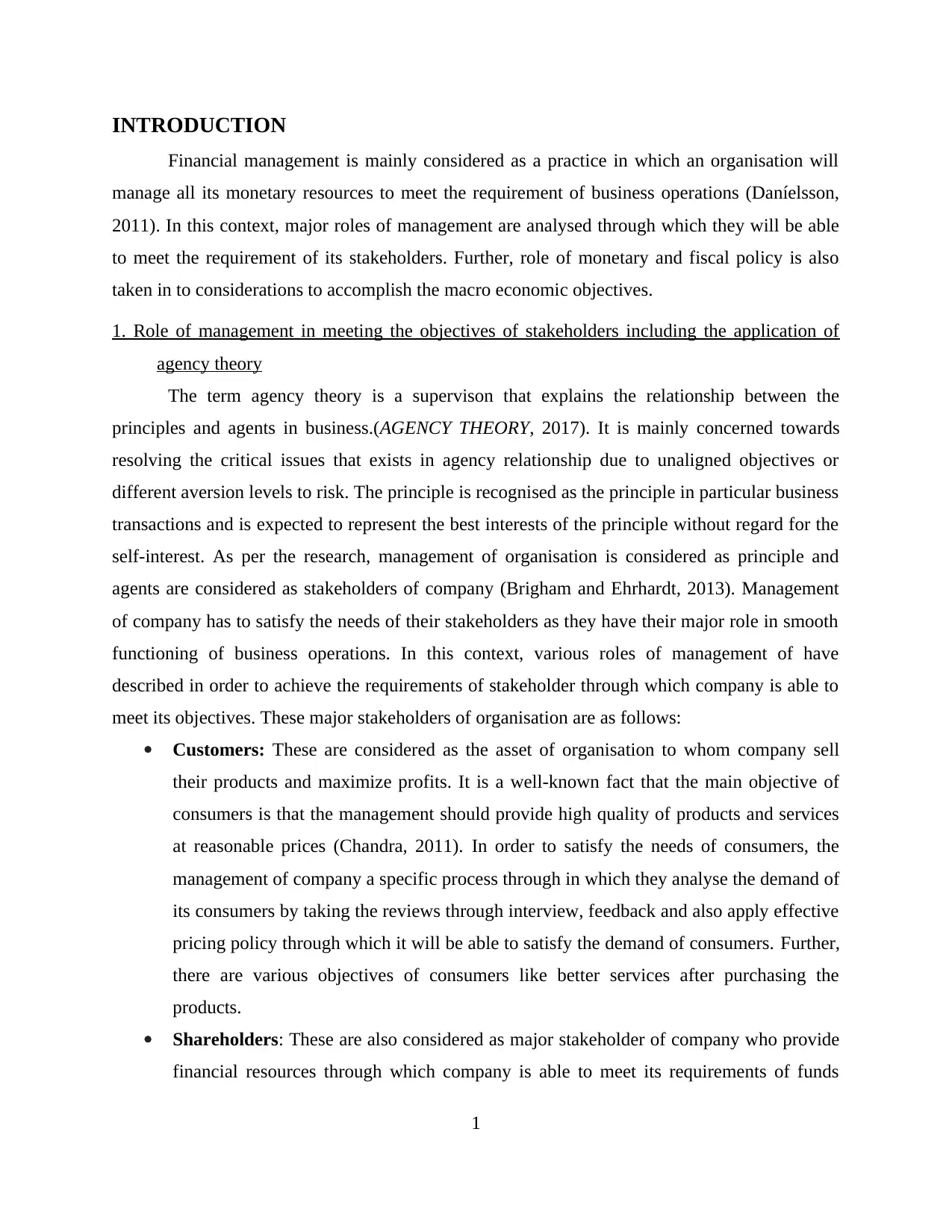
INTRODUCTION
Financial management is mainly considered as a practice in which an organisation will
manage all its monetary resources to meet the requirement of business operations (Daníelsson,
2011). In this context, major roles of management are analysed through which they will be able
to meet the requirement of its stakeholders. Further, role of monetary and fiscal policy is also
taken in to considerations to accomplish the macro economic objectives.
1. Role of management in meeting the objectives of stakeholders including the application of
agency theory
The term agency theory is a supervison that explains the relationship between the
principles and agents in business.(AGENCY THEORY, 2017). It is mainly concerned towards
resolving the critical issues that exists in agency relationship due to unaligned objectives or
different aversion levels to risk. The principle is recognised as the principle in particular business
transactions and is expected to represent the best interests of the principle without regard for the
self-interest. As per the research, management of organisation is considered as principle and
agents are considered as stakeholders of company (Brigham and Ehrhardt, 2013). Management
of company has to satisfy the needs of their stakeholders as they have their major role in smooth
functioning of business operations. In this context, various roles of management of have
described in order to achieve the requirements of stakeholder through which company is able to
meet its objectives. These major stakeholders of organisation are as follows:
Customers: These are considered as the asset of organisation to whom company sell
their products and maximize profits. It is a well-known fact that the main objective of
consumers is that the management should provide high quality of products and services
at reasonable prices (Chandra, 2011). In order to satisfy the needs of consumers, the
management of company a specific process through in which they analyse the demand of
its consumers by taking the reviews through interview, feedback and also apply effective
pricing policy through which it will be able to satisfy the demand of consumers. Further,
there are various objectives of consumers like better services after purchasing the
products.
Shareholders: These are also considered as major stakeholder of company who provide
financial resources through which company is able to meet its requirements of funds
1
Financial management is mainly considered as a practice in which an organisation will
manage all its monetary resources to meet the requirement of business operations (Daníelsson,
2011). In this context, major roles of management are analysed through which they will be able
to meet the requirement of its stakeholders. Further, role of monetary and fiscal policy is also
taken in to considerations to accomplish the macro economic objectives.
1. Role of management in meeting the objectives of stakeholders including the application of
agency theory
The term agency theory is a supervison that explains the relationship between the
principles and agents in business.(AGENCY THEORY, 2017). It is mainly concerned towards
resolving the critical issues that exists in agency relationship due to unaligned objectives or
different aversion levels to risk. The principle is recognised as the principle in particular business
transactions and is expected to represent the best interests of the principle without regard for the
self-interest. As per the research, management of organisation is considered as principle and
agents are considered as stakeholders of company (Brigham and Ehrhardt, 2013). Management
of company has to satisfy the needs of their stakeholders as they have their major role in smooth
functioning of business operations. In this context, various roles of management of have
described in order to achieve the requirements of stakeholder through which company is able to
meet its objectives. These major stakeholders of organisation are as follows:
Customers: These are considered as the asset of organisation to whom company sell
their products and maximize profits. It is a well-known fact that the main objective of
consumers is that the management should provide high quality of products and services
at reasonable prices (Chandra, 2011). In order to satisfy the needs of consumers, the
management of company a specific process through in which they analyse the demand of
its consumers by taking the reviews through interview, feedback and also apply effective
pricing policy through which it will be able to satisfy the demand of consumers. Further,
there are various objectives of consumers like better services after purchasing the
products.
Shareholders: These are also considered as major stakeholder of company who provide
financial resources through which company is able to meet its requirements of funds
1
⊘ This is a preview!⊘
Do you want full access?
Subscribe today to unlock all pages.

Trusted by 1+ million students worldwide
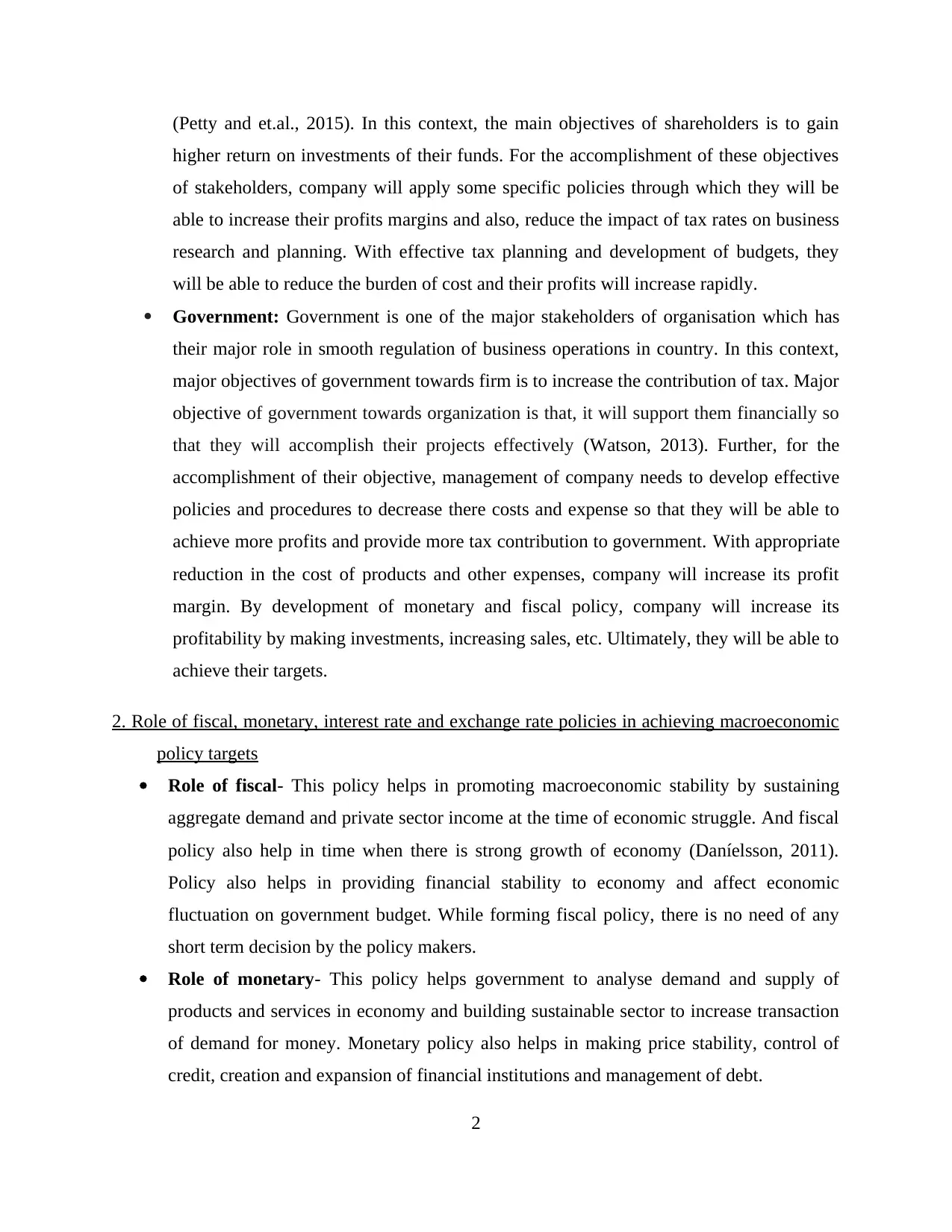
(Petty and et.al., 2015). In this context, the main objectives of shareholders is to gain
higher return on investments of their funds. For the accomplishment of these objectives
of stakeholders, company will apply some specific policies through which they will be
able to increase their profits margins and also, reduce the impact of tax rates on business
research and planning. With effective tax planning and development of budgets, they
will be able to reduce the burden of cost and their profits will increase rapidly.
Government: Government is one of the major stakeholders of organisation which has
their major role in smooth regulation of business operations in country. In this context,
major objectives of government towards firm is to increase the contribution of tax. Major
objective of government towards organization is that, it will support them financially so
that they will accomplish their projects effectively (Watson, 2013). Further, for the
accomplishment of their objective, management of company needs to develop effective
policies and procedures to decrease there costs and expense so that they will be able to
achieve more profits and provide more tax contribution to government. With appropriate
reduction in the cost of products and other expenses, company will increase its profit
margin. By development of monetary and fiscal policy, company will increase its
profitability by making investments, increasing sales, etc. Ultimately, they will be able to
achieve their targets.
2. Role of fiscal, monetary, interest rate and exchange rate policies in achieving macroeconomic
policy targets
Role of fiscal- This policy helps in promoting macroeconomic stability by sustaining
aggregate demand and private sector income at the time of economic struggle. And fiscal
policy also help in time when there is strong growth of economy (Daníelsson, 2011).
Policy also helps in providing financial stability to economy and affect economic
fluctuation on government budget. While forming fiscal policy, there is no need of any
short term decision by the policy makers.
Role of monetary- This policy helps government to analyse demand and supply of
products and services in economy and building sustainable sector to increase transaction
of demand for money. Monetary policy also helps in making price stability, control of
credit, creation and expansion of financial institutions and management of debt.
2
higher return on investments of their funds. For the accomplishment of these objectives
of stakeholders, company will apply some specific policies through which they will be
able to increase their profits margins and also, reduce the impact of tax rates on business
research and planning. With effective tax planning and development of budgets, they
will be able to reduce the burden of cost and their profits will increase rapidly.
Government: Government is one of the major stakeholders of organisation which has
their major role in smooth regulation of business operations in country. In this context,
major objectives of government towards firm is to increase the contribution of tax. Major
objective of government towards organization is that, it will support them financially so
that they will accomplish their projects effectively (Watson, 2013). Further, for the
accomplishment of their objective, management of company needs to develop effective
policies and procedures to decrease there costs and expense so that they will be able to
achieve more profits and provide more tax contribution to government. With appropriate
reduction in the cost of products and other expenses, company will increase its profit
margin. By development of monetary and fiscal policy, company will increase its
profitability by making investments, increasing sales, etc. Ultimately, they will be able to
achieve their targets.
2. Role of fiscal, monetary, interest rate and exchange rate policies in achieving macroeconomic
policy targets
Role of fiscal- This policy helps in promoting macroeconomic stability by sustaining
aggregate demand and private sector income at the time of economic struggle. And fiscal
policy also help in time when there is strong growth of economy (Daníelsson, 2011).
Policy also helps in providing financial stability to economy and affect economic
fluctuation on government budget. While forming fiscal policy, there is no need of any
short term decision by the policy makers.
Role of monetary- This policy helps government to analyse demand and supply of
products and services in economy and building sustainable sector to increase transaction
of demand for money. Monetary policy also helps in making price stability, control of
credit, creation and expansion of financial institutions and management of debt.
2
Paraphrase This Document
Need a fresh take? Get an instant paraphrase of this document with our AI Paraphraser
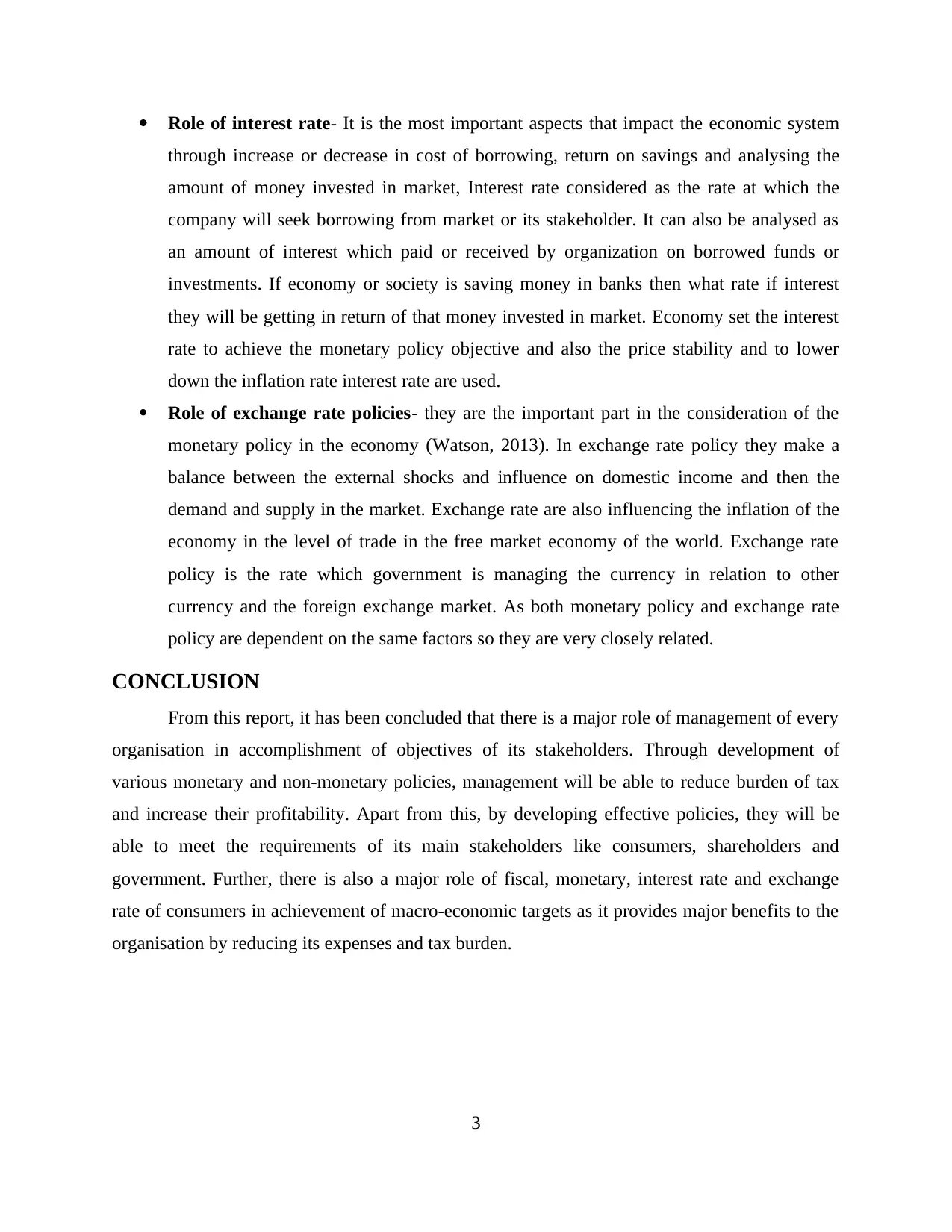
Role of interest rate- It is the most important aspects that impact the economic system
through increase or decrease in cost of borrowing, return on savings and analysing the
amount of money invested in market, Interest rate considered as the rate at which the
company will seek borrowing from market or its stakeholder. It can also be analysed as
an amount of interest which paid or received by organization on borrowed funds or
investments. If economy or society is saving money in banks then what rate if interest
they will be getting in return of that money invested in market. Economy set the interest
rate to achieve the monetary policy objective and also the price stability and to lower
down the inflation rate interest rate are used.
Role of exchange rate policies- they are the important part in the consideration of the
monetary policy in the economy (Watson, 2013). In exchange rate policy they make a
balance between the external shocks and influence on domestic income and then the
demand and supply in the market. Exchange rate are also influencing the inflation of the
economy in the level of trade in the free market economy of the world. Exchange rate
policy is the rate which government is managing the currency in relation to other
currency and the foreign exchange market. As both monetary policy and exchange rate
policy are dependent on the same factors so they are very closely related.
CONCLUSION
From this report, it has been concluded that there is a major role of management of every
organisation in accomplishment of objectives of its stakeholders. Through development of
various monetary and non-monetary policies, management will be able to reduce burden of tax
and increase their profitability. Apart from this, by developing effective policies, they will be
able to meet the requirements of its main stakeholders like consumers, shareholders and
government. Further, there is also a major role of fiscal, monetary, interest rate and exchange
rate of consumers in achievement of macro-economic targets as it provides major benefits to the
organisation by reducing its expenses and tax burden.
3
through increase or decrease in cost of borrowing, return on savings and analysing the
amount of money invested in market, Interest rate considered as the rate at which the
company will seek borrowing from market or its stakeholder. It can also be analysed as
an amount of interest which paid or received by organization on borrowed funds or
investments. If economy or society is saving money in banks then what rate if interest
they will be getting in return of that money invested in market. Economy set the interest
rate to achieve the monetary policy objective and also the price stability and to lower
down the inflation rate interest rate are used.
Role of exchange rate policies- they are the important part in the consideration of the
monetary policy in the economy (Watson, 2013). In exchange rate policy they make a
balance between the external shocks and influence on domestic income and then the
demand and supply in the market. Exchange rate are also influencing the inflation of the
economy in the level of trade in the free market economy of the world. Exchange rate
policy is the rate which government is managing the currency in relation to other
currency and the foreign exchange market. As both monetary policy and exchange rate
policy are dependent on the same factors so they are very closely related.
CONCLUSION
From this report, it has been concluded that there is a major role of management of every
organisation in accomplishment of objectives of its stakeholders. Through development of
various monetary and non-monetary policies, management will be able to reduce burden of tax
and increase their profitability. Apart from this, by developing effective policies, they will be
able to meet the requirements of its main stakeholders like consumers, shareholders and
government. Further, there is also a major role of fiscal, monetary, interest rate and exchange
rate of consumers in achievement of macro-economic targets as it provides major benefits to the
organisation by reducing its expenses and tax burden.
3
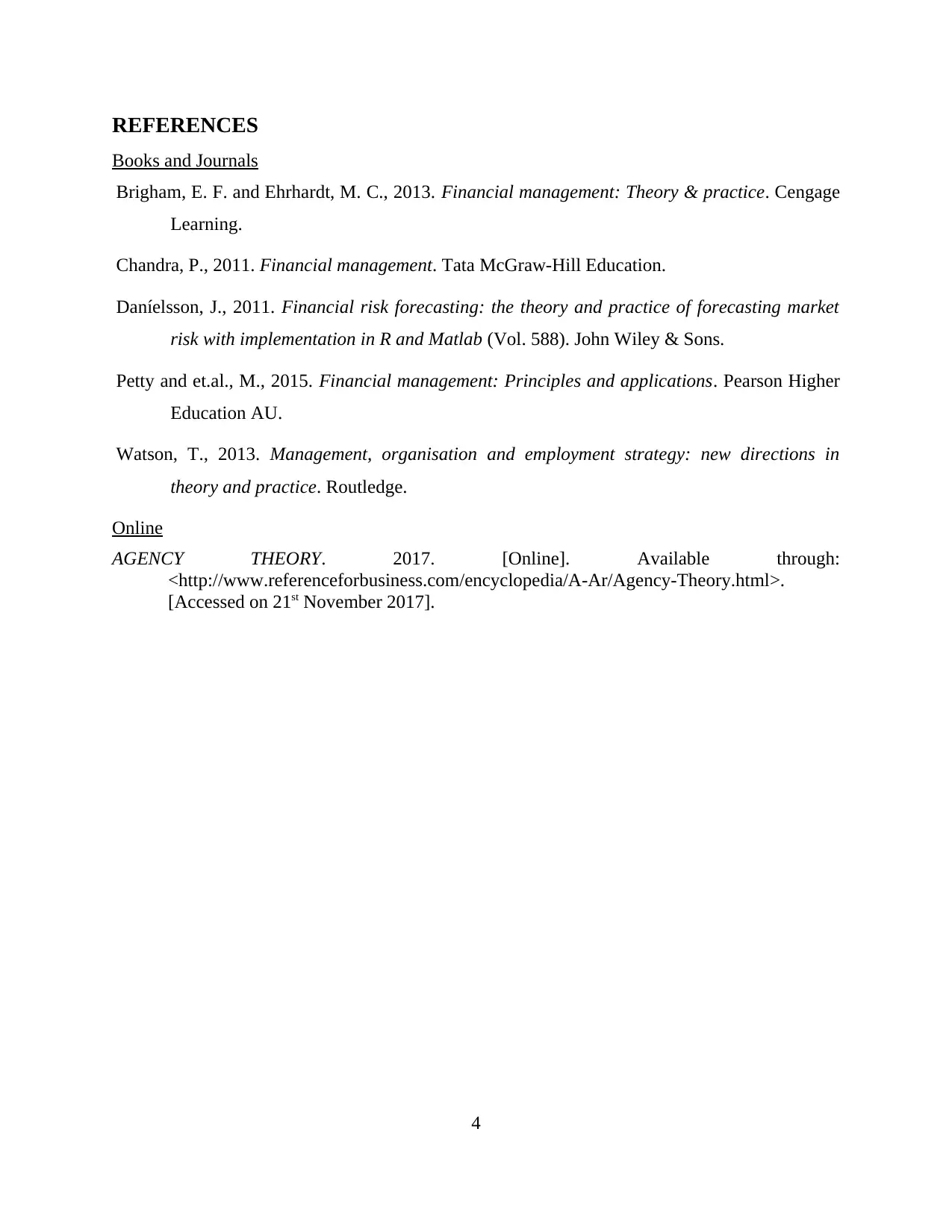
REFERENCES
Books and Journals
Brigham, E. F. and Ehrhardt, M. C., 2013. Financial management: Theory & practice. Cengage
Learning.
Chandra, P., 2011. Financial management. Tata McGraw-Hill Education.
Daníelsson, J., 2011. Financial risk forecasting: the theory and practice of forecasting market
risk with implementation in R and Matlab (Vol. 588). John Wiley & Sons.
Petty and et.al., M., 2015. Financial management: Principles and applications. Pearson Higher
Education AU.
Watson, T., 2013. Management, organisation and employment strategy: new directions in
theory and practice. Routledge.
Online
AGENCY THEORY. 2017. [Online]. Available through:
<http://www.referenceforbusiness.com/encyclopedia/A-Ar/Agency-Theory.html>.
[Accessed on 21st November 2017].
4
Books and Journals
Brigham, E. F. and Ehrhardt, M. C., 2013. Financial management: Theory & practice. Cengage
Learning.
Chandra, P., 2011. Financial management. Tata McGraw-Hill Education.
Daníelsson, J., 2011. Financial risk forecasting: the theory and practice of forecasting market
risk with implementation in R and Matlab (Vol. 588). John Wiley & Sons.
Petty and et.al., M., 2015. Financial management: Principles and applications. Pearson Higher
Education AU.
Watson, T., 2013. Management, organisation and employment strategy: new directions in
theory and practice. Routledge.
Online
AGENCY THEORY. 2017. [Online]. Available through:
<http://www.referenceforbusiness.com/encyclopedia/A-Ar/Agency-Theory.html>.
[Accessed on 21st November 2017].
4
⊘ This is a preview!⊘
Do you want full access?
Subscribe today to unlock all pages.

Trusted by 1+ million students worldwide
1 out of 6
Related Documents
Your All-in-One AI-Powered Toolkit for Academic Success.
+13062052269
info@desklib.com
Available 24*7 on WhatsApp / Email
![[object Object]](/_next/static/media/star-bottom.7253800d.svg)
Unlock your academic potential
Copyright © 2020–2026 A2Z Services. All Rights Reserved. Developed and managed by ZUCOL.





